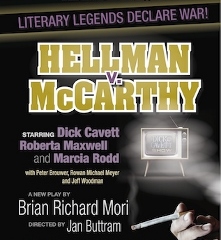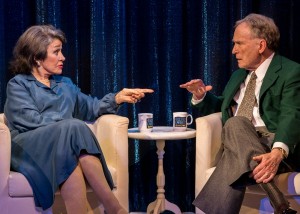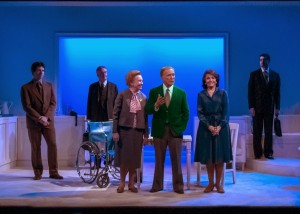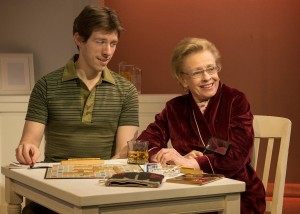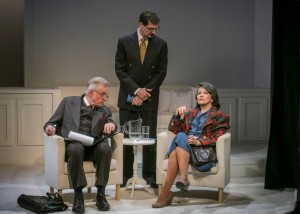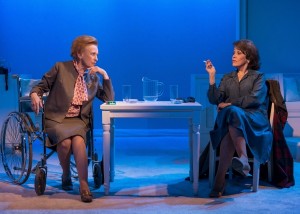A FAMOUS LITERARY FEUD MAKES GREAT DRAMA
In 1980, in a television interview with Dick Cavett, novelist and literary critic Mary McCarthy made an especially biting comment about her longtime adversary and fellow writer, playwright and memoirist Lillian Hellman, saying that “every word she writes is a lie, including ’˜and’ and ’˜the.’” Unfortunately, Hellman was watching the show that night, and the next morning she initiated a $2,500,000 lawsuit that would remain unresolved until her death four years later.
The feud was the source material for Nora Ephron’s Imaginary Friends, a play with songs (music by Marvin Hamlisch, lyrics by Craig Carnelia). The 2002 work imagined Hellman and McCarthy reunited in hell. Even with Cherry Jones as McCarthy and Swoosie Kurtz as Hellman, Ephron’s first theatrical work was considered by most to be wonky, and the Broadway production closed after 76 performances.
A dozen years later, the feud is back on stage, this time in a drama by Brian Richard Mori. Directed by Abingdon Theatre Company Artistic Director Jan Buttram, the play features powerful performances by Roberta Maxwell as Hellman and Marcia Rodd as McCarthy. The big attraction, however, is Dick Cavett, who is at his charming best playing himself.
Andrew Lu’s scenic design allows the audience to imagine itself as the studio audience in the original Cavett show. Later the set becomes both Hellman’s living room and the law offices of their respective attorneys: Burt Fielding (Jeff Woodman) for McCarthy and Lester Marshall (Peter Brouwer) for Hellman. At times McCarthy and Hellman are both in their domains reacting to each other’s comments.
Hellman, ailing and feeble, is in the care of a devoted, gay nurse, Ryan Hobbs (Rowan Michael Meyer). Hobbs is both awed and cowed by Hellman, but somehow manages to maintain a true affection for the difficult woman who takes a droll pleasure in abusing him.
Both lawyers and eventually even Ryan, advise their clients that they are acting foolishly. With the help of Cavett’s commentary, it becomes increasingly obvious to everyone but Hellman and McCarthy that the two women should take the advice of the more sober-minded people around them. But anger, the desire for revenge, and self-righteousness prevail.
The highlight of the play is the imagined meeting between Hellman and McCarthy. It has been arranged by their lawyers with the idea that McCarthy will offer some kind of apology and Hellman will accept. Things go seriously awry, but for the audience the pathos is mixed with a good deal of biting humor.
Although most people in the literary community, as well as Cavett, sided with McCarthy, the poorer and less famous of the two, in this play it is curiously Hellman who comes off as more sympathetic. This is partly because Mori has given her cleverer lines, but also because Maxwell is such a superb actress she could make us feel bad for the devil.
Many people today have no idea who Lillian Hellman and Mary McCarthy were or what they were known for (perhaps folks remember Mary’s brother, actor Kevin McCarthy). Nevertheless, in a world rife with complaints about the incivility and bullying that goes on over the Internet, it’s nice to know that sophisticated and intelligent people could be every bit as ill-mannered and ill-tempered without the aid of technology.
Hellman v. McCarthy
Abingdon Theatre Company
Abingdon Theatre Arts Complex
June Havoc Theatre
312 West 36 Street
scheduled to end on April 13, 2014
for tickets, call 866-811-4111
or visit www.abingdontheatre.org
